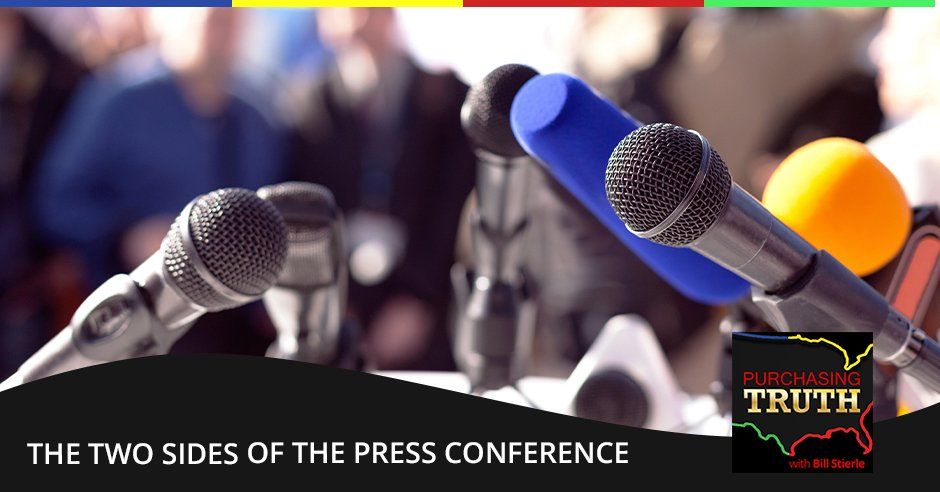The Two Sides of the Press Conference
Subscribe Today!
The American press conference is one of the sought-out activities by the general public for its subtle surprises. Every word and punctuation mark from President Joe Biden will be labeled to everyone’s ears. While that sounds collectively obedient, not everyone listens to affirm, it may be that they are waiting for a slip of tongue to amplify and create unexpected tensions from a supposed to be a kind sentence. In this episode, host Bill Stierle and co-host Tom provide a healthy discussion about potential questions and topics to president Biden. Join in the conversation because every topic and response is possible.
---
Watch the episode here
Bill, Joe Biden is having his first official press conference.
It’s coming up.
He’s waited longer than most new presidents to have a press conference. It brings to mind a lot of issues around communication. How will he handle tough questions and what will he say? I’m quite sure he may face some challenges with trying to manage the message and to be effective in the press conference. We don’t even know what he’s going to say, but I like the idea of us talking about what he could say.
Everybody is trying to get their needs met during this thing. If they are an enemy or an adversary of the president, they’re going to look for the mistake or the gaffe, the 1, 2 or 3 items that they want to amplify. There needs to be a chance to be an amplification of wrong or right, good or bad. Whatever the amplification is, if you’re an ally, they’re going to try to reduce the mistake and call it no big deal. The other side says, “No, it is a big deal.” There’s always going to be this throwing weights on their end of the scale to see if they can get the item to stick and be something that they can run against, they can do a TV ad about, they can cut it in a tragic way to paint the character or paint the individual in a way that’s not flattering.
We have a press corps and the White House messaging that shows up. I thought it would be fun, Tom, if you and I would do some communication and see how the White House probably would like it to be handled and maybe how the enemies would like to hear that message. Hopefully, they’ll say it this way so they can run with it, and/or what is the most effective and most compassionate way to say it, which is the third alternative that I’d be happy to provide some influence on and some insight on about how to craft that and where the landmines are in communications. We’re going to walk ourselves into the landmines and see what we can do. What do you think would be a tough question that the press corps would probably ask? There are a lot of new things that have happened. Let’s see if we can get a response. I’ll show you the middle of the road response and then the compassionate response.
Let me try one on here for size. “Mr. President, we’ve now been seeing pictures from the Southern border of seriously overcrowded facilities for immigrants trying to come into this country. What is your administration doing to improve that?”
His response would be, “We’re going to do our best to provide care and support for the people that are showing up at our shores. The facilities are horrific. We need to improve what is happening at the border now.”
People listen to a press conference to try and find mistakes that they want to amplify. Click To Tweet
What he’ll say is, “We need to do better.” Do you think that’s what he’ll say?
It’s going to go down to, “We need to do better.” There are people showing here. We’ve got to treat it like a humanitarian issue, an economic issue and a safety issue, which it is. It’s an economic issue on our side when it gets to what the immigrant does when they get here. What most Americans don’t know and they don’t even want to talk about is that most immigrants are paying into the system at the beginning and getting nothing back. They’re literally sacrificing their life for a better life for their children. The first generation bites the dirt. They literally get bit like zip. They’ve got to live under the radar. There are all kinds of problems and stuff. Let alone, there’s no solid path to immigration because one group is saying, “If I fix the path to immigration, I have nothing to run on as a platform.” We’ve talked about that in the past. Let’s see if we can up Joe Biden’s game a little bit here.
What could he say that would land better and not get him in trouble in some ways?
It might sound like this, “Over our country’s history. We have stood for providing a place for the immigrant to come here and contribute to this country in positive ways. Most immigrants do that. We still need to meet the need for safety and protection for the Americans that are here, including their jobs. The main thing is if a person is willing to commit to American values, economy, capitalism and the growth of the United States, they can work to become an American because that’s been our brand. That is the most important thing America stands for. It’s the ability to come here. We provide a place for you to have freedom and to grow and develop yourself and be a part of the American experience.”
As I’m sticking the landing there, I’m painting the vision of America. It gives little details for somebody to pick on. It’s not a lot to pick on because that’s the vision. Most Americans are having at the back of their mind, “My grandparents or my great grandparents came here.” There are not as many Americans that come here and say, “Because I’ve been here for five generations, therefore, everybody else can’t be here. By the way, we were getting rid of those Indians anyways.” They’re not in any social collective response. They think, “I’m here. I own this because I have the property I bought here. I belong here because I’m an American.”
The challenge is to make sure that Joe Biden does not go into explanation. Explanation is not empathy. It does not create much sympathy. It can create understanding, but when an issue is this emotionally hot, you’ve got to use empathy before you use problem solving or explanation. You’ll get into trouble explaining things because an explanation can be taken apart and cut into, “This is what you said while you were explaining.” Explanations are usually somewhere around 7 or 13 sentences long. Ask your kid this question, “I noticed something spilt over there.” “I didn’t do it. This is the reason why. It wasn’t my fault.” You want to go, “Is my kid a liar or what?” They’re covering.
Explanation will tend to get us into trouble. It’s one of those examples of non-empathetic responses that I have a list of that are going to be a tragic part of this press conference. We’ve got to be ready because the press corps and the White House doesn’t fully know what they’re doing regarding communication expertise. They’re going to be safe. They’re going to say something, but they won’t necessarily get something to stick. It will be flat. What people do is call that political. It’s not political. It is an overcommitment to protection or safety so that there’s no counter-talking points that can be developed by it. What might be another question so we can have a little more fun with it?
nother question might be, “Mr. President, North Korea fired some more missiles. They’re doing more missile tests. What is the United States going to do about that?”He’ll go after the hint of retaliation and/or, “You better watch it because we might do something more to you.” In other words, “Don’t go too far or else.” There will be a little bit of or-else. It won’t be as overt as much as Donald Trump was. Donald Trump was over like, “We’ll bomb you off the face of the Earth.” Within a short time it’s, “I wrote him love letters. We’ve written love letters between the two of us.” Donald Trump did what many branding and marketing people do. He overpromise on the up and then overpromise or over-mitigate on the down, “Here’s what it is. It didn’t do that. I thought it did. That’s not the one I said.” Regrettably, in order to show strength and confidence, one of the things he could do is saying, “The need for safety for Americans and American allies is one of my top priorities.”
He now has the ally piece in it. North Korea is trying to meet their need for protection and safety, not because there’s any specific threat in their direction, but they believe there is one. What I did was call them someone that is illusionary. If I want to reduce them on the world stage, it might sound like this, “North Korea and its leadership gets to decide about how North Korea gets to run their leadership, but at no time do they get to infringe over the safety or the protection of us or our allies. We will treat it as such.” Notice I didn’t threaten, but I did threaten them.
You lay out what they’re allowed to do or maybe what they’re trying to do, and then what’s not going to be allowed, but you didn’t make it me versus him. You made it our allies, we’re not going to allow our safety or protection to be infringed.
We’re going after the need for safety and the need for protection. If he wants to get his own need for recognition met, Joe Biden could also say this, “I’ve been there and done this regarding wars. I know how to make these decisions. I know where the line is. It’s up for them not to cross it. It might be a good idea for them to reconsider.” Notice I added my sales piece of doubt and skepticism in there. I put it in there going like, “He’s crazier than Donald Trump because we don’t know what he’s going to do.” Donald Trump is, “I’m going to bomb the shit of you or I am going to love you and give you a hug and teddy bear, then I still get to get away with what I’m doing over here.” Joe Biden can do a thing called “I’ve been there, done this.”
Not so much as a one-upping because one-upping is not an empathetic or sympathetic way to go, but you want to still hold the need for respect and recognition that, “I see that you have some cards over there, but I have more cards than you do.” Let the person know that you’re open to talking and providing them support in a certain way, but not if they’re going to be at the expense of safety and protection for allies. That’s the way to go. It’s almost like he’s casting doubt on the rocket capabilities out of North Korea to even get there because the allies are what he’s interested in. He’s sending a message to Japan and South Korea that he’s got their back.
Determine the most effective, most compassionate way of delivering the message to avoid landmines in communications. Click To Tweet
He’s not saying his missiles can’t reach the United States. He wasn’t expressing in your answer anything that would suggest that he’s concerned about North Korea being a real threat to the United States. I liked how he could have used the allies as making this about something much bigger than the United States.
The press corps, what else would they ask?
It might be a follow-up question even on this one. “Mr. President, I’m sure you’re aware that there have been over 250 bills proposed in state legislatures around the country since the 2020 election that are aimed at restricting voting rights in one way or another. How do you feel about that? What are you going to be able to do to help get some of the federal voting rights bills that have been passed by the House approved by the Senate?”
“I appreciate both the questions. The first part of the question is that it’s one person, one vote. One legal American voter per vote. I am going to fight for that. I am going to stand for our ability to choose leadership. It is important for states to recognize and to follow what the United States stands for, which is one voter, one vote, and not to put things in the way of that process of choosing leadership. Leadership is to be chosen by the people in every state. The role of the Federal Government is to provide support for that to take place and to do what it can to make that stable, trusting and certainty that that vote is going to come from the person and go and be counted. That’s one of the things that we experienced during this last selection. It was one vote. Even though there was counter-messaging to that, we’re coming to discover that that counter-messaging was an order to create loyalty in a way that was not in alignment with what American stands for. We don’t stand for how to marginalize people. We want to be advocates for how do we work together as people. Would it be better if America worked as a collaborative and come up with the best answer rather than who has the most votes? How about that?”
I’m being a little glib there with my last little comment, but it is a way to advocate for value. Don’t advocate for a process, advocate for the value. This is the value that we’re going for. Joe Biden, don’t get caught in the weeds. Don’t go after any detail of any state. If they ask a specific state question like, “This is what Georgia is doing. What do you think about that?” Georgia ran a fair and even election. They counted their party’s votes. I feel disheartened that they think that they would like to make it less fair.
Wouldn’t it be nice if Joe Biden said something like that? I tend to think that Joe Biden answering that question might drift into blaming and shaming the Republicans for trying to restrict voting.
I would stay out of that mud pit. Don’t even jump in there. It’s interesting to see what the good people of Georgia are going to do to make sure that each of their citizens get the right to vote. It seems like they’re interested in reducing that. I don’t think that meets the need for fairness or integrity of what we stand for as a nation. This is one of the things that the people of Georgia have to fight with their legislators. They have to vocalize that they don’t want it to happen that way. I’m empowering the state people to do that. There are other states that are having similar problems too, and the people in those states need to be heard that it’s one vote for one registered voter. That’s the way this one works because our people choose our leadership. That’s what we do. We live by that. You might not like it but that’s what we choose to do here.
t’s interesting because this question would seem an opportunity not only to talk about what’s happening that’s not in alignment with this American process called democracy, but it’s also an opportunity to cast doubt on the big lie from the 2020 election.You don’t even have to mention the big lie. You’ve got to go like, “This is what’s recorded. We’re starting to notice that play out in the courts right now with the various different lawsuits that are being levied by certain individuals and certain businesses that the need for truth wasn’t met. They’re going to hear it out in the court systems about how truth was not met and how people were trying to get respect and recognition for themselves by not being truthful with the American public. It’s caused us a lot of damage and we’re going to be spending time undoing the damage that was done regarding trust and integrity in our voting. For those people who are looking at it specifically and the people that are on the ground, those are the people that know. This has been tested in the courts. I’m interested if there is widespread voting fraud. I want to make sure that doesn’t place under my watch. This is going to make it harder to be free to vote and express who you wanted as your leader. That doesn’t go so well. It’s not what America stands for. Is it?”
You posed the question back now. That would hang out there in the air. You could hear a pin drop.
When you ask a question back regarding a value, and it radiates through the universe in such a powerful way.
Can we ever get a leader of our country that’s a skilled communicator and knows what they’re doing in this regard? They would rule the world. That’s funny because they’re supposed to be the leader of the free world.
It’s the free world versus the constricted world. The constricted world still has a foothold. The constricted world still has the needs of the few over the needs of the many, instead of the needs of the few being accepted as well as the advocacy for the needs of the many. It’s not the needs of the few over the needs of the many or the needs of the many over the needs of the few. It’s needs of the many, not at the expense of the needs of the few. It’s how you get the balance of those things. If it’s the 1% of wealthy people that would be pissed off at me and say, “The needs of the many over the needs of the few, you’re taking money out of my pocket.” The answer is, we want to make it fair. Also, you were able to be successful within this system. You’re a part of us. This is what the game is.
Here’s the natural follow-up question to that, “Mr. President, are you going to run for re-election in 2024?”
“I am interested in providing this country stability and certainty and be able to provide leadership beyond these four years. I will get to that decision and you will know about that as time goes on. The main thing I’m focusing on is the here and now of America versus my future three years or three and a half years from now.”
That would be a good answer, Bill. That’s the Bill Stierle for sure. I bet you anything he’s going to go somewhere different and give a more direct answer to the question or deflect it and say, “It’s not time to discuss that.” He could do that. He could deflect it, saying, “We’ve just gotten started. We’ll talk about re-election in a few years, maybe.”
An explanation is not empathy. It can create understanding but it does not create sympathy. Click To Tweet
A few small pieces of vocabulary make a big difference, Tom. Certainty, stability, consistency, predictability. Those words add to confidence, then that cultivates trust. We’ll see when we get there, but I’m working on these ones. That is the way this particular administration is rolling. It is very administrative and safe. It’s a little bit like a machine. They’re rolling in here and going like, “This is the way we’re going to roll this thing forward.” The various different institutions used to do a wonderful job of collaborating and cooperating until they started getting carved up, divided up, and people started leaving because they couldn’t take it anymore. Now they’re moving back into more cooperation and collaboration and more effectiveness. It’s going to come back.
It doesn’t mean the individual person or you’re not going to find somebody to complain about that because it might not be the best thing, but it’s the stable thing. We could argue about in any time in the Joe Biden administration if they said, “We can argue about what the best practice is, but right now we’re picking the stable practice.” All of a sudden, everybody shuts up. “Do you want the best practice? Put your skin in the game. Right now, we’re picking the stable process.” Things tend to go better.
I enjoyed that.
There are going to be a couple of these coming up because of the regular press conferences with the press director.
Jen Psaki, the Press Secretary.
She’s pretty good and yet she gets herself into a little bit of trouble because she’ll get stuck in correcting, consoling, explaining a bit too much, fix it narrative or storytelling. She’ll get caught in some languaging patterns that doesn’t serve her or the administration. Mostly she’s been a pretty good straight arrow about answering questions, but a few lines of compassion and empathy woven in and a little bit more visionary leadership messages would be so helpful to our country. It would be so helpful to give us something to stand on. More to come.
Thank you so much, Bill. I’ll talk to you next time.
Take care.
Love the show? Subscribe, rate, review, and share!








